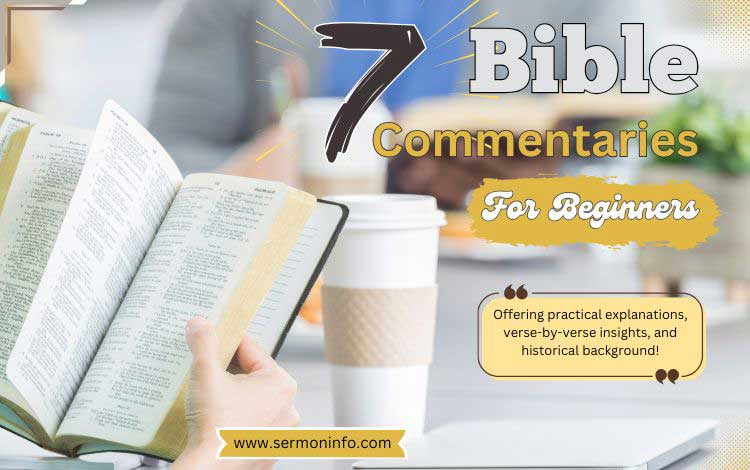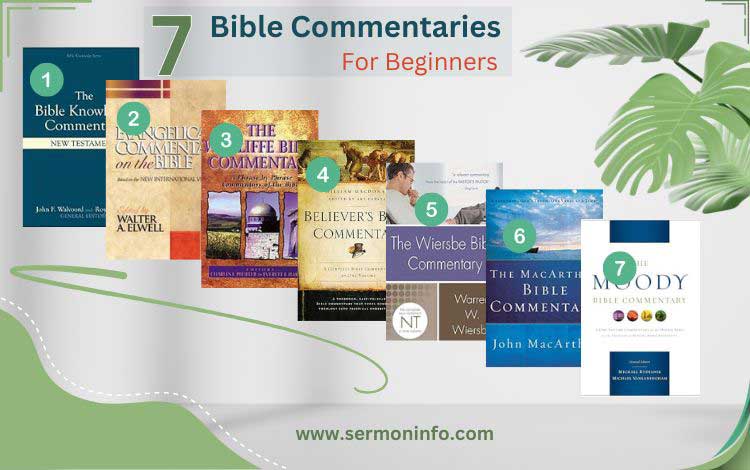7 Bible Commentaries for Beginners include: 1) Believer’s Bible Commentary, 2) Wiersbe Bible Commentary, 3) MacArthur Bible Commentary, 4) Evangelical Bible Commentary, 5) Wycliffe Bible Commentary, 6) Bible Knowledge Commentary, and 7) Moody Bible Commentary.

7 Bible Commentaries For Beginners
Studying the Bible can feel overwhelming without guidance, but a good commentary makes it easier to understand Scripture. Bible commentaries provide historical context, theological insights, and practical applications to help readers grow in their faith.
With many options available, beginners need a resource that is clear, accessible, and insightful. These 7 Bible commentaries for beginners offer practical explanations, verse-by-verse insights, and historical background to deepen understanding. Whether for personal study or group discussions, these guides help make Scripture more meaningful and easier to apply.
1. Believer’s Bible Commentary
Believer’s Bible Commentary by William MacDonald is a clear and concise single-volume commentary known for its practical approach and faith-based perspective.
A. Attributes
William MacDonald approaches Scripture with a strong commitment to biblical inerrancy and Christ-centered interpretation. He explains theological concepts from a traditional evangelical viewpoint.
This single-volume commentary includes insights on all 66 books. MacDonald simplifies complex passages without sacrificing depth or clarity.
Unlike scholarly commentaries, this resource emphasizes how Scripture applies to daily life. It encourages spiritual growth through practical lessons and reflections.
B. Application
Readers can use this commentary for daily study or in group discussions. It provides clear explanations that encourage reflection and conversation.
MacDonald’s straightforward writing style makes complex biblical themes accessible. He avoids technical jargon, making it easy for new believers to understand.
The commentary consistently points to Jesus as the focus of Scripture. It explains doctrine without overwhelming the reader with academic terminology.
C. Reviews
Many readers appreciate its conversational style. It feels like a personal guide rather than a textbook.
Beginners find it helpful because of its clarity and focus on spiritual growth. It bridges the gap between devotional reading and deeper study.
Scholars seeking extensive Greek or Hebrew analysis may find it too simple. However, it remains an excellent starting point for beginners.
2. Wiersbe Bible Commentary
Wiersbe Bible Commentary by Warren Wiersbe is a practical and devotional two-volume set that explains the Bible in a way that encourages spiritual growth.
A. Attributes
Warren Wiersbe writes as a pastor speaking to his congregation. He blends biblical teaching with practical wisdom to encourage spiritual growth.
This commentary is available in two volumes (Old Testament and New Testament), making it easier to study specific sections. Each volume offers a structured and clear analysis.
Wiersbe simplifies biblical themes without oversimplifying their meaning. He writes in an engaging style that keeps readers interested and motivated.
B. Application
Readers can use this commentary for personal reflection or sermon outlines. Its insights apply to everyday life and spiritual teaching.
Wiersbe connects Scripture to real-life experiences. He encourages readers to apply biblical truths in practical and meaningful ways.
This commentary does more than explain Scripture—it challenges readers to live out their faith. Each section offers actionable insights.
C. Reviews
Many readers love its clear and engaging explanations. It speaks to both new believers and experienced Christians seeking encouragement.
The commentary emphasizes personal transformation. Readers often describe it as uplifting, motivational, and deeply relevant to their faith journey.
Those looking for complex doctrinal analysis may want a more academic resource. However, its simplicity makes it perfect for beginners.

3. MacArthur Bible Commentary
MacArthur Bible Commentary by John MacArthur is a detailed, verse-by-verse commentary by a renowned Bible teacher and pastor.
A. Attributes
John MacArthur draws from decades of ministry, providing deep biblical insights. His extensive knowledge helps readers understand Scripture with accuracy and clarity.
This commentary emphasizes a straightforward, word-for-word understanding of the Bible. It avoids allegorical interpretations, keeping the focus on the original text.
MacArthur explains the historical background of each passage. He highlights cultural details that clarify the meaning of difficult verses.
B. Application
This commentary balances deep study with clear explanations. It challenges readers to think critically while remaining understandable for non-scholars.
Pastors and teachers rely on its in-depth insights. Individual readers also benefit from its thorough verse-by-verse analysis.
Those who value detailed, Bible-centered teaching will find this resource helpful. MacArthur’s interpretations align with traditional evangelical doctrine.
C. Reviews
Many readers praise its thorough and precise explanations. It provides a strong foundation for serious Bible study.
Christians seeking deep theological understanding appreciate this commentary. It offers more than surface-level explanations.
Those unfamiliar with theological terms may find it challenging. However, its clarity makes it accessible with time and effort.
4. Evangelical Commentary of the Bible
Evangelical Commentary of the Bible edited by Walter A. Elwell is a comprehensive and balanced commentary reflecting a broad evangelical perspective.
A. Attributes
This commentary brings together experts from different theological backgrounds. Their combined knowledge provides a well-rounded and balanced interpretation of Scripture.
Readers can study the entire Bible without switching between books. This makes it convenient for quick reference and comprehensive study.
The authors explain deep biblical truths in a way that remains clear and understandable. They avoid excessive technical language or academic jargon.
B. Application
This commentary offers perspectives from different evangelical traditions. Readers gain a broad yet unified view of biblical teaching.
Church leaders and everyday believers benefit from its accessible explanations. It helps clarify complex theological concepts for all readers.
Small groups and Bible study classes can use this commentary for guided discussions. It presents various viewpoints while staying rooted in Scripture.
C. Reviews
Many readers value its ability to present different perspectives fairly. It does not push one theological stance over another.
Those new to Bible study find it helpful without feeling overwhelmed. It offers enough depth without becoming too technical.
This commentary leans toward academic explanation rather than personal application. Those seeking a reflective or emotional connection may prefer another resource.
5. Wycliffe Bible Commentary
Wycliffe Bible Commentary edited by Charles F. Pfeiffer & Everett F. Harrison is a classic evangelical commentary providing historical and literary insights.
A. Attributes
This commentary includes insights from respected theologians. Their combined expertise ensures a thorough and reliable interpretation of Scripture.
Each book receives careful analysis. The commentary explores key themes, historical context, and doctrinal significance.
The authors highlight the Bible’s cultural background. Understanding ancient customs and literary styles helps readers interpret Scripture accurately.
B. Application
This resource explains biblical events within their historical setting. Readers gain deeper insight into how culture shaped biblical teachings.
Serious students and researchers benefit from its scholarly approach. It provides historical facts that enrich Bible study.
New readers find clear explanations, while experienced students appreciate its depth. It bridges the gap between introductory and advanced study.
C. Reviews
Many readers admire its academic depth without excessive complexity. It presents solid biblical teaching in a structured way.
The commentary’s emphasis on history helps clarify difficult passages. Understanding the past brings the Bible’s message to life.
Readers seeking emotional or personal application may prefer another resource. This commentary prioritizes factual analysis over inspirational reflection.
6. Bible Knowledge Commentary
Bible Knowledge Commentary edited by John F. Walvoord & Roy B. Zuck is a highly respected dispensational commentary written by Dallas Theological Seminary scholars.
A. Attributes
This commentary takes a traditional, Bible-centered approach. It explains each verse clearly while maintaining a strong commitment to evangelical theology.
Walvoord and Zuck, both from Dallas Theological Seminary, bring decades of expertise. Their theological training ensures well-researched and biblically sound interpretations.
Readers gain insights into biblical prophecy, key doctrinal themes, and historical settings. This helps them understand Scripture with greater depth and accuracy.
B. Application
This resource offers deep theological insight while remaining readable. It avoids overly technical language, making it accessible for both students and teachers.
Those curious about prophecy or theology will find clear explanations. The commentary connects Old and New Testament teachings on these topics.
Pastors, seminary students, and dedicated learners benefit from its structured approach. It provides reliable content for sermon preparation and advanced study.
C. Reviews
Many readers appreciate its well-organized structure and insightful explanations. It presents complex topics in a way that is easy to follow.
This commentary follows a dispensationalist interpretation of Scripture. Readers who share this viewpoint find it particularly helpful.
Some new readers might struggle with its academic tone. However, those willing to engage deeply will find it rewarding.
7. Moody Bible Commentary
Moody Bible Commentary edited by Michael Rydelnik & Michael Vanlaningham is a modern, evangelical commentary with a focus on practical interpretation.
A. Attributes
This commentary reflects the theological depth of Moody Bible College scholars. It presents Scripture from a Christ-centered, Bible-affirming perspective.
Every book receives careful analysis, with insights into language, context, and interpretation. Readers gain a deeper understanding of Scripture’s meaning.
Rydelnik, a Jewish believer in Jesus, highlights connections between the Old and New Testaments. His insights enrich the study of biblical prophecy.
B. Application
This resource balances theological depth with practical application. It helps readers apply biblical truth to daily life and spiritual growth.
The commentary explains how Old Testament prophecies point to Jesus. It strengthens faith by showing God’s redemptive plan in Scripture.
Pastors, teachers, and students benefit from its structured insights. It provides reliable material for sermons, lessons, and personal devotion.
C. Reviews
Many readers appreciate its blend of academic insight and clear explanations. It remains engaging while offering deep theological content.
The commentary’s emphasis on Jewish history and prophecy appeals to those exploring the Bible’s cultural background. It enhances understanding of Scripture’s unity.
While rich in content, its depth may be overwhelming for light reading. However, those seeking serious study will find it rewarding.
Conclusion
Choosing the right Bible commentary helps beginners grow in their faith and understanding. Each of these seven resources offers unique insights and perspectives.
Some commentaries focus on practical application, while others emphasize historical, theological, or prophetic details. Readers can select one that best fits their study needs.
Whether for personal devotions, group discussions, or sermon preparation, these guides make Scripture clearer. With the right resource, Bible study becomes more meaningful and enriching.
